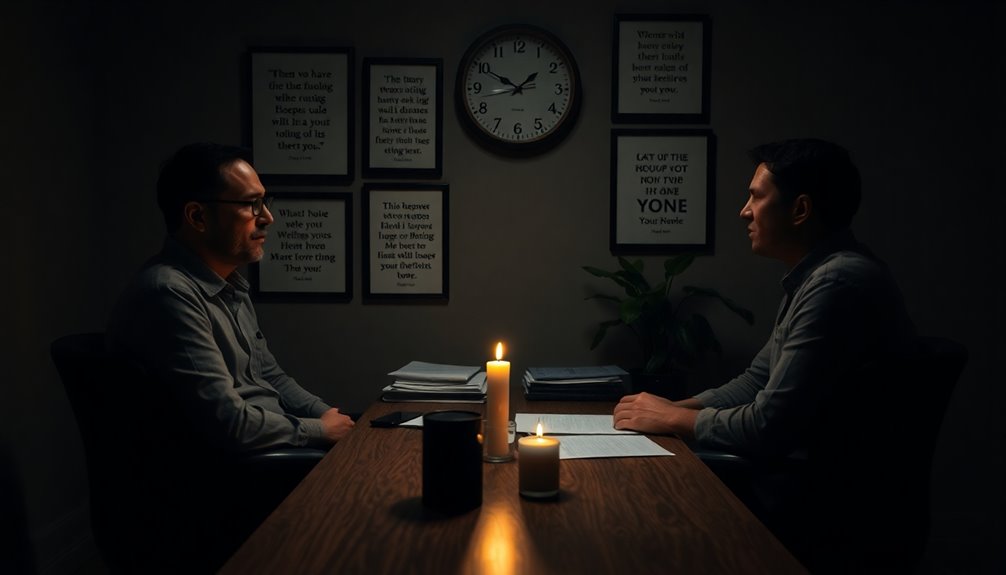Unpacking the failure question in interviews helps you demonstrate self-awareness and growth potential. When you discuss a past failure, make sure to take responsibility and focus on what you learned. Using the STAR method can help structure your response—clearly describe the situation, your actions, and the positive results that followed. Avoid blaming others or sharing negative examples that could undermine your integrity. Instead, choose failures that highlight your ability to adapt and improve. This approach not only enhances your communication skills but also showcases your capacity for meaningful change. There's much more to explore that can boost your interview performance.
Key Takeaways
- Understand that discussing failures showcases self-awareness and accountability, which are valued by employers.
- Use the STAR method to structure your response: Situation, Task, Action, Result.
- Select failures that resulted in positive outcomes or significant learning experiences to demonstrate growth.
- Take full responsibility for your failures and highlight the lessons learned to show adaptability.
- Practice your responses with role play and seek feedback to refine your narrative and enhance clarity.
Importance of Discussing Failures

Discussing failures in interviews can reveal much about your self-awareness and accountability. When you share your experiences, interviewers gauge your ability to recognize risks and learn from your mistakes.
This acknowledgment of weaknesses isn't just about admitting faults; it shows your potential for growth. By discussing failure stories, you can illustrate your problem-solving skills and how you've adapted over time.
Effective communication about these experiences can greatly enhance your chances of being hired. Remember, it's not just about the failure itself, but how you approached it and what you learned.
This indicates that you're capable of reflecting on your actions and making meaningful changes, which is an essential quality in any candidate.
Example Answers Using STAR Method

When preparing for failure questions, using the STAR method can help you structure your responses effectively.
For instance, if you faced a task error, explain the situation: you mistakenly processed client information, leading to pushback.
Describe the actions taken—consulting your manager to improve strategies and implementing preventive measures.
Conclude with results, noting how you've maintained error-free performance since.
Alternatively, if procrastination impacted your work, share how you recognized the issue stemmed from a confidence gap.
Mention shadowing colleagues and reviewing training materials to enhance your skills.
Finally, emphasize your improved time management.
Preparing for the Interview

Preparing for an interview involves reflecting on past failures to choose the most relevant examples that showcase your growth and self-awareness.
To guarantee your preparation is effective, consider the following steps:
- Think Deeply About the Answer: Select a failure that highlights qualities relevant to the job, focusing on positive outcomes and lessons learned.
- Practice the Answer: Role play with friends to simulate interview conditions, improving your confidence and recall.
- Seek Honest Feedback: Encourage colleagues to provide constructive criticism to refine your narrative and enhance self-awareness.
- Stay Positive: Choose stories that conclude with a meaningful lesson, showcasing your adaptability and growth mindset.
Additionally, remember that seeking professional help can provide valuable insights into your emotional readiness and personal growth during challenging times.
These steps can help you articulate your experiences effectively and leave a lasting impression.
Dos for Answering Failure Questions

Acknowledging your failures during an interview can be a powerful tool for showcasing your growth and resilience. First, take responsibility for your failure; this illustrates accountability.
Next, focus on the lessons you learned and how you've applied them to prevent future mistakes. Keep your narrative concise and relevant to the job you're applying for, ensuring it resonates with the interviewer's needs.
Utilize the STAR method to structure your response clearly, highlighting the Situation, Task, Action, and Result.
Finally, emphasize the positive changes that resulted from your failure, showcasing your adaptability and commitment to personal development. By doing this, you'll leave a strong impression of your ability to learn from setbacks and grow professionally.
Don'ts for Answering Failure Questions

Steering through failure questions in interviews requires caution to avoid common pitfalls that can undermine your credibility. You want to make sure your responses reflect your growth and accountability, not detract from it.
Here are some key don'ts to keep in mind:
- Avoid blaming others for your failure; take full responsibility.
- Don't choose a failure that reflects poorly on your integrity or work ethic.
- Steer clear of overly negative examples that might leave a bad impression.
- Avoid vague or unoriginal stories; they lack depth and fail to engage your interviewer.
Common Themes in Failure Responses

Many candidates showcase similar themes when discussing failures in interviews, which can reveal valuable insights into their character and growth. A consistent theme is accountability; candidates often take responsibility for their mistakes instead of placing blame.
Another common thread is the emphasis on lessons learned; you'll likely highlight how the failure prompted personal or professional development.
Many candidates also illustrate resilience, demonstrating their ability to bounce back from setbacks.
Communication plays an essential role, too, as candidates frequently share how they improved their interactions with others following a failure.
Finally, candidates tend to focus on specific outcomes, showcasing their growth over time and setting the stage for future success in the workplace.
Strategies for Effective Self-Presentation

Effective self-presentation in interviews can greatly influence a candidate's chances of success. To make a lasting impression, you should focus on these strategies:
- Be Authentic: Share genuine stories about your failures and what you learned from them. Authenticity builds trust with interviewers.
- Use the STAR Method: Structure your responses using Situation, Task, Action, and Result to clearly convey your experiences.
- Highlight Growth: Emphasize how you've grown from your failures, showcasing your resilience and adaptability.
- Practice Makes Perfect: Rehearse your answers with friends or family to boost your confidence and guarantee clarity during the actual interview.
- Acknowledge Individual Responses: Remember that just as people cope with divorce in different ways, interviewers may also have unique perspectives on failure based on their own experiences.
Additional Resources for Interview Success

To ace your interview, tapping into additional resources can make a significant difference. Consider exploring articles that investigate common interview questions like "What is your biggest failure?" These resources often provide effective strategies for crafting your responses.
You might also find it helpful to read about accountability in the workplace, which can enhance your understanding of teamwork dynamics. Additionally, articles on self-presentation can help you articulate your strengths confidently.
Don't forget to seek out feedback from colleagues or mentors; their insights can refine your narratives. Finally, practice consistently to increase your comfort level during interviews. Understanding emotional dysregulation can also prepare you for answering questions about failure with resilience.
Frequently Asked Questions
How Can I Identify My Biggest Failure for Interviews?
To identify your biggest failure for interviews, think about moments when you faced significant challenges.
Reflect on experiences where you learned valuable lessons or improved your skills.
Consider situations that highlight your growth and accountability.
Avoid examples that could reflect poorly on your integrity.
Once you pinpoint a failure, structure your response using the STAR method to clearly outline the situation, your actions, and the positive outcomes that followed.
What Industries Focus More on Failure Discussions During Interviews?
Industries like tech, healthcare, and finance often focus heavily on failure discussions during interviews.
In these fields, understanding how you handle setbacks is essential. Employers want to see your self-awareness, problem-solving skills, and ability to adapt.
How Should I Handle Follow-Up Questions About My Failure?
When you face follow-up questions about your failure, it can feel like a tightrope walk.
Start by staying calm and focused. Acknowledge the failure, but steer the conversation toward what you learned.
Highlight specific actions you took to improve and how those changes benefited your work.
Remember, the key is to show growth and resilience.
It's your chance to transform a setback into a compelling story of personal development.
Can I Share Team Failures Instead of Personal Ones?
You can share team failures, but make sure to emphasize your role and contributions.
It's essential to showcase your awareness of the situation and the lessons learned.
Focus on how you helped the team improve or adapt after the failure.
This approach highlights your teamwork skills and accountability while demonstrating your ability to reflect on experiences.
Just remember to keep the narrative relevant and positive to make a strong impression.
What if I Have No Significant Failures to Discuss?
If you feel you have no significant failures to discuss, think creatively about smaller setbacks that taught you valuable lessons.
Even minor experiences can highlight your growth and self-awareness. Reflect on challenges that pushed you out of your comfort zone or mistakes that led to improvements.
Conclusion
To summarize, addressing failures in interviews can greatly enhance your narrative, showcasing your resilience and growth. Notably, a study found that 60% of hiring managers prioritize a candidate's ability to learn from mistakes over their past achievements. By embracing the failure question and preparing thoughtful responses using the STAR method, you can transform potential weaknesses into strengths that resonate with employers. Remember, it's not just about the setback; it's about how you bounced back and evolved from it.









